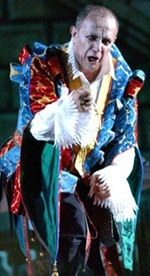

"Rigoletto" is a very unusual opera as its central character is hardly heroic. Rigoletto is the hunchback jester attached to the court of Duke of Mantua. The Duke (a tenor) is one of the leading characters but he has attitudes and behavior which do not invite admiration!
Though required to create humour in the court, Rigoletto has a rather grim view of life and his relationship with the courtiers is not an easy one. One of the courtiers curses Rigoletto and this curse dwells heavily on the jester. Indeed, the first motif which we hear in the musical introduction to the opera is the 'curse motif'.
The plot is based on Victor Hugo's 'Le roi s'amuse'. Verdi had difficulty getting this subject past the censors and had to reluctantly change the setting from a royal to a ducal court. Verdi had many brushes with the censors during his lifetime, some of which are difficult for us to understand as the protection of aristocrats from ridicule is not one of the main concerns of the present day.
Rigoletto has a beautiful daughter called Gilda but he keeps her at home, hidden from the world. Needless to say, this arrangement is not going to last and the Duke soon discovers her and follows her. She is taken in by his advances and Rigoletto is not there to save her. In the opera we are not quite clear as to whether she has been raped or seduced but clearly she regrets what has gone on, initially at least.
Rigoletto is incensed that his beautiful daughter has been taken by the Duke and arranges for a contract killer, Sparafucile, to kill the Duke.Later that evening, Sparafucile's sister, Maddalena persuades him to spare the Duke who she has taken a shine to herself and instead to kill the first person to knock on their door who, of course, happens to be Gilda.
Rigoletto comes to retrieve the body and is about to throw it into the river when he hears the Duke singing 'La donna e mobile' which we have been introduced to earlier when his cavalier attitude to women was established. The inspired use of this supremely popular aria in such a dramatic way has tremendous power. For Rigoletto this melody shatters everything as he opens the sack to discover Gilda. He finishes the opera with the exclamation 'La maledizione!' - the curse!
To keep up to date with the latest news and tours, follow us on Twitter...